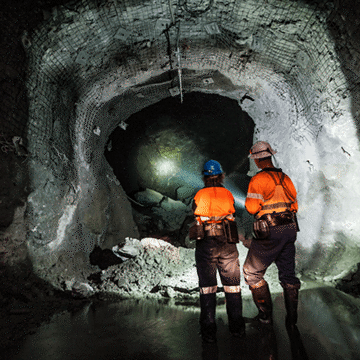
Hydraulic Fracture Simulation of 3D Fracture Networks
Elevate your geotechnical and hydrogeological problem-solving with XSite. Essential for hydraulic fracturing simulations of your energy or mining operation. Optimize solutions now with XSite!

SOLUTIONS FOR VARIED GEOTECHNICAL CHALLENGES
What Kinds Of Problems Can XSite Solve?

Energy
- Unconventional Oil and Gas Reservoirs
- Enhanced Geothermal Systems
- CO2 Sequestration
- Environmental Impact

Mining
- Preconditioning Hard Rocks for Cave Mining
- Improve Caveability and Enhance Fragmentation
- Reduce Seismic Hazards through Destressing
- Safety and Risk Management
WHY YOU'LL LOVE IT
Why Choose XSite?
Explore XSite's comprehensive features and user-friendly interface. Unlock powerful computing capabilities, including the ability to run two models simultaneously. Discover why XSite is the ideal choice:
Applications
- Reservoir-scale, multi-well, multi-stage field stimulation by multiple fracture propagation with application to both petroleum, Engineered Geothermal System (EGS), and rock mass preconditioning (mining industry) operations
- Simulation of fracture propagation on reservoir scales
- Near-wellbore models to simulate fracture initiation
- Proppant transport and placement
- Prediction of microseismicity
- Rock mass preconditioning for mining operations
Analysis
- Mechanical (statics, small-strain)
- Fluid Flow
- Microseismics
- Thermal analysis
- Proppant
- Lattice Method
- Synthetic Rock Mass
- Thermo-Hydro-Mechanical coupling
- Hydraulic fracturing
- Heat conduction, advection, and convective heat exchange
Ease of Use
- Streamlined modeling and simulation workflows
- Automated processes for efficient modeling
- GUI that allows visualization of model setup and results
- Built-in logic for proppant transport and fracture interaction
- User-friendly settings for simulations
- Integrated borehole flow calculations
- Automated tracking and recording of synthetic microseismicity
- Easy and fast model discretization
- Easy and automated setup of multistage stimulation from multiple wells
- Capability to reuse model components (e.g., pumping schedule, well geometry, stage and cluster design)
Speed
- High-performance numerical simulation
- Fast and accurate hydraulic fracturing modeling
- Efficient multi-threaded processing for quicker results
- Implicit scheme for fluid flow simulation
- Rapid resolution of hydraulic fracture interactions
- Speedy modeling of multiple wellbores, stages, and clusters
- Optimized simulations of THM coupled processes including sub-stepping and multistepping
- Fast scheme for simulation of loosely coupled THM processes during long-term fluid circulation
- Fast simplified logic for simulation of hydraulic fracture propagation in the toughness-dominated regime
- Quick calculation of proppant transport and fracture interaction
- Swift tracking and recording of synthetic microseismicity
Powerful Capabilities
- Three-dimensional hydraulic fracturing simulation on reservoir scales
- Hydraulic fracturing of naturally fractured reservoirs
- Simulates reservoir stimulation due to hydraulic fracturing and hydro-shearing (i.e., slip on pre-existing fractures)
- Utilizes Synthetic Rock Mass (SRM) and Lattice methods
- Models multiple wellbores with multiple stages and clusters
- Simulates three-dimensional fracture initiation from open-hole completions and perforation tunnels
- Resolves hydraulic fracture interactions, including those in naturally fractured reservoirs
- Incorporates deterministically or stochastically generated discrete fracture networks (DFNs)
- Conducts fully coupled thermo-hydro-mechanical simulations
- Heat transport models include heat conduction, advection, and convective heat exchange
- Simulates fluid flow within fracture networks and matrix flow within the intact rock
- Simulates the effects of thermally induced stress changes during long-term circulation on permeability change
- Includes proppant transport and placement logic
- Accounts for proppant’s impact on fracture closure and conductivity
- Generates synthetic microseismicity due to fracture propagation and slip on pre-existing fractures
Flexibility
- Versatile three-dimensional hydraulic fracturing simulation
- Adaptable to various wellbore configurations, including open-hole completions and perforation tunnels
- Accommodates hydraulic fracture scenarios in different reservoirs (conventional and unconventional), including those in naturally fractured reservoirs
- Simulation of hydraulic fracturing in different regimes (viscosity-dominated, toughness-dominated, leakoff-dominated) or any transitional regime
- Supports deterministic or stochastic discrete fracture network (DFN) generation
- Customizable thermo-hydro-mechanical simulations
- Flexible leakoff modeling including matrix flow and Carter leakoff
- Adjustable proppant transport and placement options
- Adaptable borehole flow calculations for various cluster configurations
- Tailorable tracking and recording of synthetic microseismicity
- Recorded microseismicity can be imported and compared with microseismicity predicted by the model
- Upscales and exports results (e.g., permeability and porosity fields) to be used by reservoir simulators
What's New Version 4.0
- Performance improvement for GUI version (2-30x depending on calculation type)
- Addition of web licenses
- Heat advection multi stepping (improving performance of heat calculations by 2-5x)
- Update to user interface, better for high resolutions displays
- Improvement of matrix flow rate calculations
- Minor improvements to preexisting functionality
- Finalized and updated documentation
HEAR FROM THOSE WHO ACHIEVED RESULTS WITH ITASCA SOFTWARE
See What Users Have To Say
"We have been successfully using XSite for over 12 years for hydraulic fracturing modeling in both conventional and unconventional reservoirs. We really like that this code accounts for much of the physics involved in the hydraulic fracturing process. Our projects have greatly benefitted not only from XSite ’s advanced capabilities but also from the close interaction and collaboration that Itasca has offered us since the beginning of our relationship."
- Ivan Gil, Manager - Unconventional Reservoirs Technology at BP America, Inc.
"In the last few years we have been using XSite as a research tool. We chose XSite because of its sound physics and user-friendliness. The lattice model of XSite inherits the merits and power of particulate Discrete Element Method (DEM) in recovering the macro-mechanical behaviors of geological materials from very simple and fundamental laws implemented at microscale. Although a micromechanics based software product, XSite is novelly designed such that it feels like a continuum mechanics software product when used, e.g., the laborious calibration process of particulate DEM modeling is not needed. In our work we implemented a strain-softening tensile strength model in XSite for simulating the tensile yielding behavior of kerogen rich shales during hydraulic fracturing stimulation. We applied XSite to study the interaction (e.g., crossing, arrest, etc.) between hydraulic fracture and natural fractures and compare the simulation results with experimental data at lab scale. We also employed XSite to model and validate the interaction of multiple fractures in multi-stage/multi-cluster hydraulic fracturing of both intact and fractured media at field scale."
- Yanhui Han, Petroleum Engineering (Geomechanics) Consultant, Aramco Americas
MORE TO LOVE
Everything You Need And More Included:
Expand your XSite software capabilities with our included options, designed to tackle diverse engineering challenges effectively. Explore our selection of options to customize your XSite experience.
Hydro-Mechanical Coupling and Flow
- Fluid flow and mechanical simulations can be done separately or coupled
- The fluid flow is approximated by a flow through a network of pipes that connect fluid elements, located at the centers of either broken springs or springs intersected by pre-existing joints
- The flow pipe network is dynamic and automatically updated by connecting newly formed micro-cracks to the existing flow network
- Non-steady fluid flow is modeled within the joint network and intact rock, maintaining continuity of fluid mass and pressures between joints and the rock matrix
- Effective stress calculations are carried out
- Fracture permeability depends on aperture, or on the deformation of the solid model
- Fluid pressure affects both deformation and the strength of the solid model
- The deformation of the solid model affects the fluid pressures (i.e., fluid pressure changes under undrained conditions)
- Includes logic for simulation of proppant transport and placement
- Newtonian and power-law fluid flow available
- Non-Darcy effects and pressure drop at perforation clusters are possible
- Represents leakoff explicitly, as flow into DFN and porous medium flow into rock matrix, or as Carter leakoff
Microseismicity
- Synthetic microseismic events are formed in the model by new micro-crack (tensile bond breaks) and slip on existing joints (assuming all slips are seismic)
- Since springs are brittle and their breakage always results in local instability, it is possible to estimate radiated seismic energy based on transient change in strain energy in the vicinity of the broken spring or micro-crack
- In the case of slippage across natural fractures, the energy released by the slip events is calculated based on the slip area, slip magnitude, and elastic properties of the surrounding medium
- Events that are related spatially and temporally are clustered together
WE'RE HERE TO HELP
Software Support
TRY IT NOW
Request Demo Download
Request a free download of our software demo to explore its features. Experience the innovation firsthand and see how it can benefit your work. Try it today!

